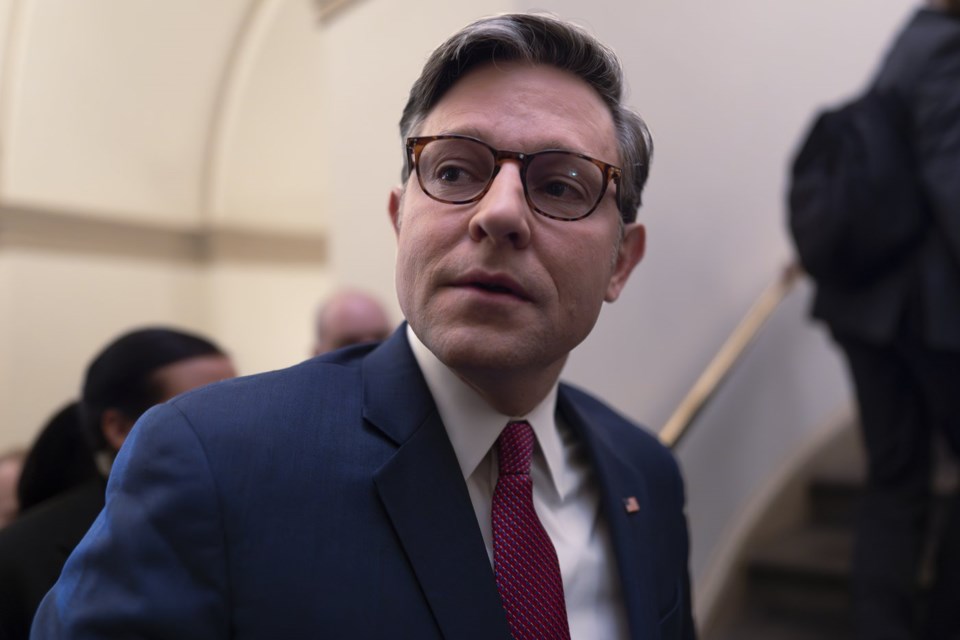WASHINGTON (AP) — House Speaker Mike Johnson vowed Tuesday to press ahead with requiring proof of citizenship for voter registration as part of a bill to avoid a partial government shutdown when the new fiscal year begins Oct. 1, though the measure appeared likely to be voted down.
Democrats overwhelmingly oppose the measure. Enough Republicans were also coming out against the bill, though for different reasons, that its prospects of passing the House appeared dim. Even if it does pass the House on Wednesday, the bill would go nowhere in the Senate.
Johnson said the issue of election security is too critical to ignore, though research has shown that voting by non-citizens is extremely rare. It's also clear that Republicans see value in making House Democrats take another vote on the issue. The House approved a bill with the proof of citizenship mandate back in July
“If you have a few thousand illegals participate in the election in the wrong place, you can change the makeup of Congress and you can affect the presidential election,” Johnson said. “The American people understand that."
The first test for the stopgap spending bill will take place with a procedural vote on Tuesday. If it clears that hurdle, a final House vote would occur Wednesday.
The measure includes a six-month extension of federal funding to keep agencies and programs operating through March 28.
But Democrats want a shorter-term extension so that the current Congress will set full-year spending levels for fiscal year 2025 rather than the next president and Congress. They also want the proof of citizenship mandate stripped out of the bill, saying it's unnecessary because states already have effective safeguards in place to verify voters' eligibility and maintain accurate voter rolls.
“Is it any surprise that the speaker's purely partisan CR seems to be running into trouble?” Senate Majority Leader Chuck Schumer said, using Washington parlance for the short-term continuing resolution needed to prevent a shutdown. “The answer is very simple. The House should stop wasting time on a CR proposal that cannot become law.”
Schumer called on Johnson to consult with Democratic leaders and the White House on a bipartisan package that can pass both chambers.
A few House Republicans have also come out against the bill. Some won't vote for any continuing resolution. They want Congress to return to passing the dozen annual appropriations bills individually. Others say the continuing resolution funds programs at levels they consider inappropriate at a time of nearly $2 trillion annual deficits.
“We need to stop spending at a level that is untenable for the American people,” said Rep. Cory Mills, R-Fla., who predicted the bill would not have the votes to pass.
Rep. Tim Burchett, R-Tenn., said Republican leadership was asking him to vote for what he called “a Nancy Pelosi-Schumer budget.”
“I just think that's a bad idea,” Burchett said.
House Republicans met behind closed doors Tuesday morning to discuss the path forward. Rep. Jim Jordan, a co-founder of the conservative House Freedom Caucus, told colleagues “this is the best fight we've ever had," said Rep. Kevin Hern, R-Okla.
By holding another vote on the proof of citizenship requirement for voter registration, House Republicans are seeking to make Democrats in competitive swing districts take another vote on the issue ahead of the election. Last time, five Democrats sided with Republicans in support of the requirement. And their vote this time will be highly scrutinized.
Lawmakers said no plan B was discussed for government funding and that Johnson was determined to hold a vote regardless of the likely outcome.
“This is important to him," said Rep. Ralph Norman, R-S.C. "This is the hill to die on.”
Kevin Freking, The Associated Press


